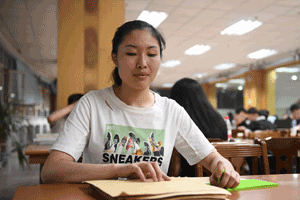Common law no guarantee of finance hub status for HK
Zhou Bajun points out that legal systems are not oil and water - Shanghai could still become a financial colossus
Some people say Hong Kong can become a global financial center while Shanghai cannot, because the former practices the common law system - along with the two existing international financial centers New York and London - whereas Shanghai exercises the continental law system.
Indeed the current global financial market system was born and raised in Great Britain and the United States. The US financial system is derived from the United Kingdom version and Hong Kong became a regional financial center in Asia under British rule. Thus the opinion mentioned above should make some sense.
However, just as no civilization in human history developed without opening up to ideas from another civilization and improving upon them one way or another, the two dominant law systems of the world - the common law and continental law systems - have never been like oil and water either. In fact, the two legal systems have borrowed from each other and become inter-complementary.
Take the relationship between the legal systems of the mainland and Hong Kong Special Administrative Region as an example. The mainland's land system reform has borrowed from Hong Kong's land system; the mainland's stock markets in Shanghai and Shenzhen also follow a set of laws and regulations modeled after the one adopted by the Hong Kong Stock Exchange; the Basic Law of the HKSAR and local laws all follow the Constitution of the People's Republic of China; in the Basic Law almost all articles and appendixes contain the offspring of the marriage between two legal systems; and, from constitutional law to civil law and corporate law, both the HKSAR and main body of the nation have shown the two legal systems can merge with or borrow from each other when necessary. Therefore, one should not overestimate the effect the two different legal systems have on Hong Kong and Shanghai's efforts to become the next global financial center in the 21st century.
I have argued in multiple commentaries published in this newspaper that Hong Kong should have what it takes to become a global financial center ahead of Shanghai as long as it handles the "physical boundary" (immigration control) and "virtual boundary" (ideological difference) with the mainland as well as the relationship between the HK dollar and yuan well.
Even if for some reason or reasons Hong Kong could not become a global financial center whereas Shanghai becomes one, its rare reputation as the freest and most open economy in the world would allow it to play the indispensable role of a vital pressure valve for the safety of Shanghai - the new international financial center - and even of the nation's finances and economy.
Given the complexity and unpredictability of the ongoing profound realignment of the global financial, economic and political dynamics, it is impossible for Shanghai to become as free and open a regional international financial center in the foreseeable future as Hong Kong already is, because there is no way the yuan can be as freely convertible as the HK dollar is.
Thus, when much of the yuan business happens in Shanghai - the new international financial center - Hong Kong's offshore yuan business can still find some room to grow, thanks to its free market and openness to Western economies. That scenario may remind people of the days when a lot of greenbacks were kept in London-based banks and often referred to as "European dollars" before the US Federal Reserve lifted Regulation Q on US banks' dollar deposits.
Hong Kong's financial market should maintain its existing ties with the present international financial system led by the US and Britain and remain open to Western economies on the one hand, and join the new financial culture and system advocated by emerging economies led by China.
On May 14 President Xi Jinping delivered a keynote speech at the opening ceremony of the Belt and Road Forum for International Cooperation in Beijing. In the speech he emphasized: "Finance is the lifeblood of the modern economy. Only when the blood circulates smoothly can one grow. We should establish a stable and sustainable financial safeguard system that keeps risks under control, create new models of investment and financing, encourage greater cooperation between government and private capital and build a diversified financing system and a multi-tiered capital market. We should also develop inclusive finance and improve financial services networks." It means China wants to motivate the international community to build a financial culture and system that not only retains some characteristics of the existing financial system led by the US and Britain but also reflects the new characteristics resulting from the changing times. It is an important move in deference to the eastward shift of the global economy and the need to push forward the global governance system reform.
Hong Kong's financial market should avoid, as best it can, intertwining with the property market and stimulating the latter's tendency to generate bubbles. Instead Hong Kong's financial industry should use its wisdom to promote global financial system reform and provide quality services to the real economies of the countries and regions along the Belt and Road. If Hong Kong keeps its strengths in financial services over Shanghai it will no doubt enjoy a head start in becoming the next global financial center.
- Dalian center gives hope to women, new life to embryos
- China holds inter-provincial disaster relief drill
- 20 years prove success of 'one country, two systems': official
- Backgrounder: What are supercomputers?
- China's two supercomputers still world's fastest as US squeezed out of 3rd place

























